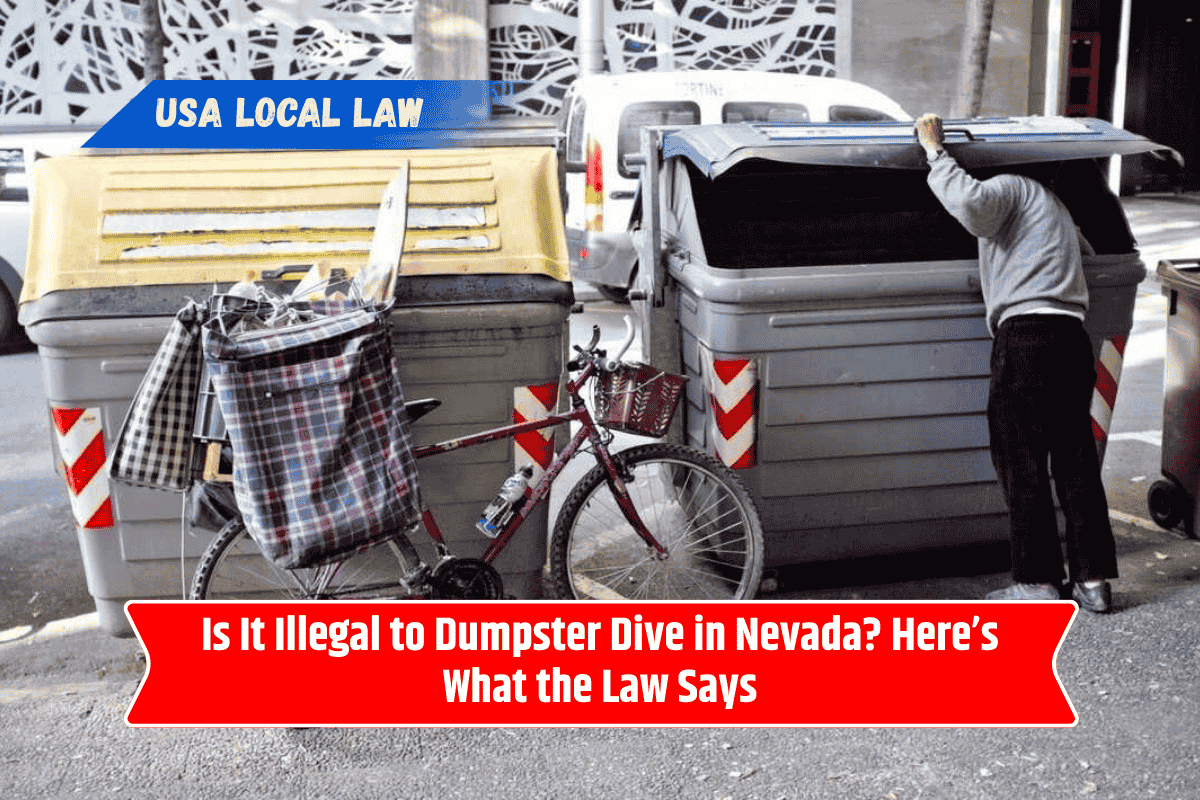Dumpster diving—searching through trash bins for usable items, food, or recyclables—is becoming more common due to rising costs of living and interest in sustainability.
But before you go diving into a bin in Nevada, it’s important to understand what the law says. Is it legal? Could you get fined or arrested? Here’s a simple guide to what you need to know about dumpster diving in Nevada in 2025.
Is Dumpster Diving Legal in Nevada?
Yes, dumpster diving is generally legal in Nevada, but with important conditions. Nevada law does not have a statewide ban on dumpster diving, but local city ordinances, property rights, and safety laws can affect whether it’s allowed in a specific location.
The key legal point: once trash is placed on public property, such as at the curb for pickup, it is no longer considered private property. That means, in theory, anyone can go through it. However, this does not give free access to private dumpsters or bins located on private property.
Where Dumpster Diving Is Usually Allowed
Dumpster diving may be legal if the following conditions are met:
The dumpster is on public property or easily accessible from a public space (like a sidewalk or alley).
There are no signs stating “No Trespassing” or “Private Property.”
You are not breaking any local noise or littering ordinances.
You are not damaging property, making a mess, or disturbing others.
Some common places where people legally dumpster dive in Nevada:
Behind retail stores or strip malls (if no “No Trespassing” signs are posted)
Public recycling or donation bins (check for signs)
Apartment complexes with bins not behind locked fences
When Dumpster Diving Becomes Illegal
Even if state law allows it in general, dumpster diving in Nevada can still become illegal under these conditions:
Trespassing: Entering private property (e.g., behind fences or gates) is illegal.
Ignoring posted signs: “No Trespassing” or “Private Property” signs make it illegal to enter, even if the bin is visible from the street.
Disturbing the peace: Loud activity or creating a mess may lead to fines or police involvement.
Tampering with locked bins: Breaking locks or damaging property is a criminal offense.
Dumpster diving in residential neighborhoods: This is often discouraged and can lead to complaints, especially if you are seen as suspicious or causing a disturbance.
Local Laws Matter
Some Nevada cities have stricter rules. For example:
Las Vegas: Has ordinances against trespassing and scavenging in certain areas. Most commercial dumpsters are on private property.
Reno and Henderson: May enforce local codes about littering or accessing private waste containers.
It’s always smart to check local city ordinances or call the non-emergency police line if you’re unsure about the rules in your area.
Can You Get Arrested for Dumpster Diving?
You likely won’t be arrested just for dumpster diving in public spaces. But you can get arrested or fined for:
Trespassing
Damaging property
Ignoring warnings from store staff or security
Disorderly conduct or public nuisance
The first response from law enforcement is usually a warning, but repeated offenses or complaints can lead to legal action.
Tips for Dumpster Diving Legally and Safely
If you choose to dumpster dive in Nevada, follow these tips to stay within the law:
Avoid private property and locked areas
Go during daylight to avoid looking suspicious
Bring gloves and a flashlight for safety
Never leave a mess behind
Respect signs and security staff
Stick to public or clearly accessible commercial areas
Being polite, discreet, and clean goes a long way in avoiding trouble.
Dumpster diving is not outright illegal in Nevada, but it depends heavily on where and how you do it. As long as you avoid trespassing, respect private property, and follow local laws, you’re unlikely to face legal issues.
However, crossing onto private land, diving into locked bins, or making a scene could quickly turn a simple search into a criminal offense. Stay respectful, stay informed, and you can legally give unwanted items a second life in the Silver State.
